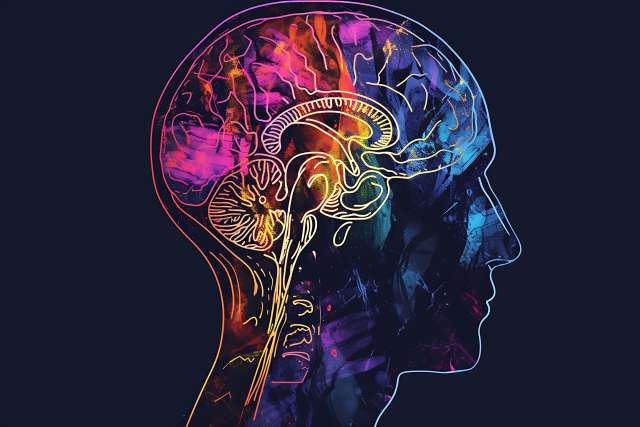Although it’s not uncommon for cancer survivors to find themselves struggling with cognitive challenges – from staying on task to recalling specific words – there are a number of coping strategies that can help.
These strategies were the focus of an online workshop led by , interim director of geropsychology with the , who reassured participants that they’re not alone in navigating these challenges.
The workshop, sponsored by the , was open to patients receiving cancer treatment at UCLA Health, along with their families and the general public.
“I think it's really important for everyone to know that the vast majority of individuals who are diagnosed with cancer and undergo multiple types of cancer treatments can experience some kind of cognitive issues at some point,” Dr. Van Dyk said.
A survey of more than 3,000 cancer survivors found that about a year post-treatment, approximately 45% of respondents reported experiencing some type of cognitive challenges, she said. These types of cognitive issues can include having trouble multitasking, difficulty finding the right words, taking longer to complete tasks and finding it challenging to learn new tasks or information.
The cause is most likely multifactorial, Dr. Van Dyk said, with chemotherapy being just one factor. Other potential contributors include the effects of radiation, the cancer itself, co-occurring health conditions, and stress, depression and/or sleep issues.
The impact on overall functioning and quality of life can lead to feeling overwhelmed and can also affect self-confidence and perceived job performance, she said.
For those struggling with these issues, “in most cases, things eventually return to ‘normal,’” Dr. Van Dyk said. Survivors should give themselves about a year after completing treatment for the issues to resolve, she added, although in some cases, the symptoms may last longer.
Supportive strategies and work-arounds
The workshop included a detailed look at the types of cognitive challenges survivors often face and offered evidence-based solutions for addressing them.
Staying on task and maintaining sustained attention: Strategies include clearing your workspace of distracting clutter, muting ringers and alarms on phones and other devices, and posting a “Do Not Disturb” sign so that others know not to interrupt, noted co-presenter Megan Frank, a psychology intern. Scheduling tasks for specific times of day can also help, as can repeating out loud what you’re there to do. Minimizing background noise, such as choosing quiet restaurants, can make it easier to focus when socializing with others.
Executive functioning: For executive functioning, which encompasses skills ranging from being able to plan and organize to being able to problem-solve, stopping to re-focus and re-orient can be extremely helpful. It’s also helpful to define your task at the start, then break it into specific steps that can be tracked on a checklist.
Checking in with yourself by monitoring your progress and crossing off the steps on the list as you go helps keep you organized, Frank said. “When you’re finished, ask yourself if you did all of the steps that you had listed and if you successfully achieved your goal,” she said. You can always go back if there's something that’s missed, but by checking in along the way, you’ll be able to track whether you were able to follow the steps you set for yourself.
Memory: Cancer survivors may find themselves grappling with a number of different memory-related issues including difficulty learning new information, remembering old information, forgetting how to do a task, and even getting lost in a familiar setting. However, the presenters emphasized, these types of cancer-related cognitive issues are separate and distinct from cognitive changes caused by neurodegenerative diseases such as Alzheimer’s. “There’s not much evidence that there’s a relationship or similarities between the cognitive problems that someone experienced in cancer treatment and either Alzheimer's disease at the time or risk for Alzheimer’s disease later in life,” Dr. Van Dyk said.
For those who struggle with memory-related issues, helpful aids include writing down or repeating back new information, jotting down reminders in a calendar, and setting alarms on your phone to trigger you to remember a task or appointment.
Language: Dr. Van Dyk reassured attendees that difficulty recalling a specific word doesn’t mean that a person’s vocabulary has actually been lost, but that the recall speed for being able to isolate and produce a particular word may be slightly compromised. “That’s very noticeable and very frustrating,” she said, “but your vocabulary is still intact.”
Strategies include finding an alternate word or description to use in the meantime, and accepting that the word may come to you later. Getting frustrated or angry at not being able to identify the intended word can actually increase cognitive interference, Frank pointed out.
Stress, self-care and other factors
In studying factors that may predispose cancer-treatment-related cognitive issues, researchers have found that people who have had significant levels of stress when growing up may be more vulnerable, Dr. Van Dyk said. It’s a theory that’s getting more traction and provides additional insights into how to best identify those who might need a little bit more support and care in their cancer journey, she said.
Dr. Van Dyk also recommended that cancer survivors struggling with cognitive issues be kind to themselves. Think about what you’d tell a friend who was having cognitive issues, she suggested, and offer yourself the same kindness. She also reminded participants that various strategies such as deep-breathing exercises, soothing touch and calming imagery can all help reduce stress levels.
As Dr. Van Dyk noted, the workshop was designed to let cancer survivors know “that they’re not alone.” A video recording of the presentation will soon be available on the Simms/Mann website, and future workshops on patient-focused topics are also planned.
“Supporting the mind, body and spirit of a person living with cancer – and their loved ones – is at the center of our work,” added Shannon LaCava, PsyD, director for the Simms/Mann Center. “Education is a primary component of our mission.”




